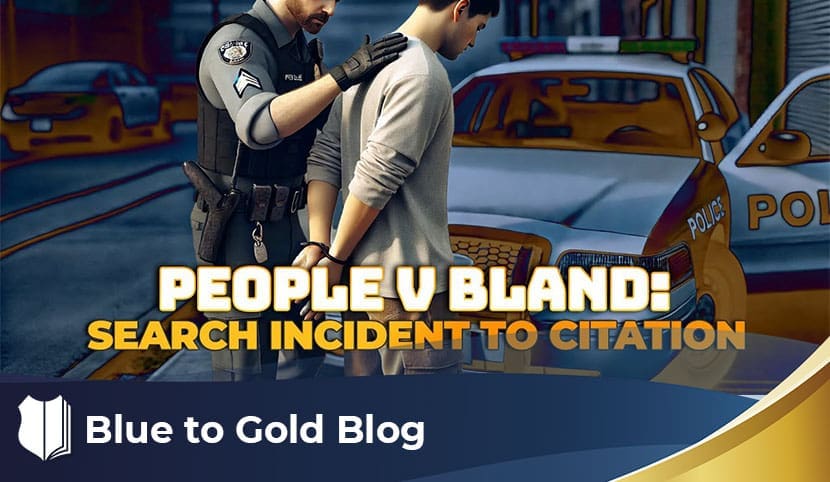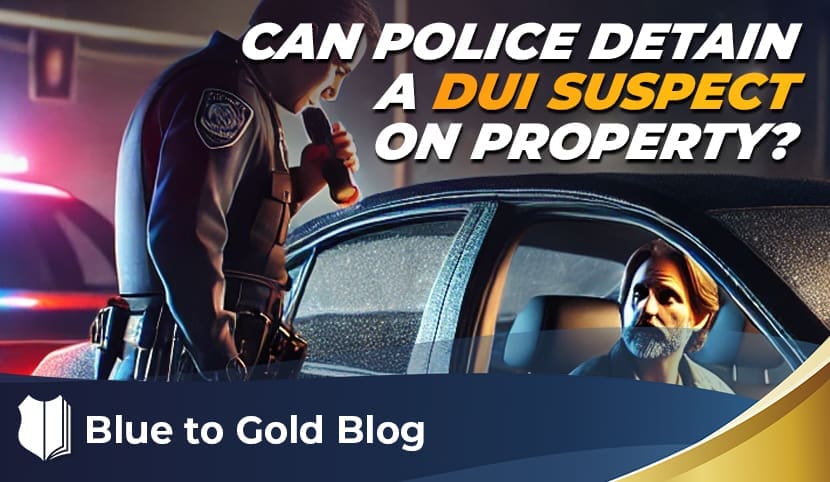All right, we’ve got another question that comes up a lot: Is a search incident to a non-custodial arrest, such as a summons for a crime where evidence could reasonably be located on a person, legal?
I received a question from a cop in Colorado who said, “I watched episode 421, which was about searches incident to a summons,” and he wanted clarification on this. He said, “I understand why a search incident to a trespass summons wouldn’t be valid, because you’re not going to find evidence of a trespass on the person—just issue the citation and let them go. But if I’m issuing a summons for misdemeanor meth possession, could I reasonably use People v. Bland as a justification to look for additional evidence of that specific crime on the person?”
What a great question, and actually, what a great case! People v. Bland is a case from 1994 out of Colorado. Here’s what happened in a nutshell: In 1994, possessing less than an ounce of marijuana was a mandatory summons. You couldn’t arrest someone for that offense. Nowadays, the rules are different in Colorado—marijuana possession under a certain amount is decriminalized, but back in 1994, it was still illegal to possess marijuana, though the legislature had decided that an arrest wasn’t necessary.
Bland was stopped because the officers reasonably believed he was in possession of less than an ounce of marijuana, but they searched him for more evidence and found additional items, leading to his arrest. The case was decided in 1994. The court held, and I quote, “Therefore, in the context of a non-custodial arrest, the arresting officer is entitled only to conduct a pat-down search for weapons in circumstances where such a search would be authorized under the Terry v. Ohio.” That makes sense, right? We can always do a Terry pat-down if we have reason to believe a person could be armed or dangerous. But the court also went on to say that a search for instrumentalities or evidence of a specific crime for which the officer had probable cause to make the arrest is allowed. Usually, in the case of a non-custodial arrest for a traffic violation, at most, only a pat-down search would be indicated because a general search wouldn’t reveal evidence of the crime. However, they also noted that a non-custodial arrest for possession of one ounce or less of marijuana could permit not only the weapons frisk, but also an extensive search for evidence of marijuana possession.
Now, my suggestion for these types of cases is that when you’re conducting evidence-related searches, you need to articulate a few things. First, you must have probable cause to believe there’s additional evidence on the person. This is what I believe the courts are looking for, especially at the Supreme Court level. In other words, if you issue a citation for paraphernalia, and then you begin searching the person, the court may ask, “Why are you searching them if you’re only issuing a citation for a meth pipe?” If you respond, “Because they had a meth pipe,” I’m not sure that will be enough. The courts are likely going to want to know why you think the person has additional evidence on them right now. They will also want to know if you have a reasonable belief that the search will turn up that evidence. That belief creates a form of probable cause because you’re planning to release them.
But, I think most importantly, the search must be limited. Bland kind of insinuates that you can do a full search incident to an arrest, even if you’re not going to arrest the person, but I don’t think the courts would have an appetite for that. For example, why would you search their wallet, or every little crevice of their wallet, shoes, and belt line? The courts would likely expect you to conduct a more circumscribed search, targeting areas where evidence could reasonably be found.
Let me give you a great example: when it comes to methamphetamine possession and a non-custodial arrest, that’s a pretty comprehensive search, because you know where the drugs could be. But, let’s say you have a non-custodial citation for shoplifting, and you have probable cause to believe they stole a candy bar. I don’t believe you can search an Altoids can unless you think the candy bar is small enough to fit in there. However, if you’re searching for narcotics, I think it’s reasonable to search the Altoids can since it’s a common place where people might hide drugs.
And until next time, my friends, stay safe.





